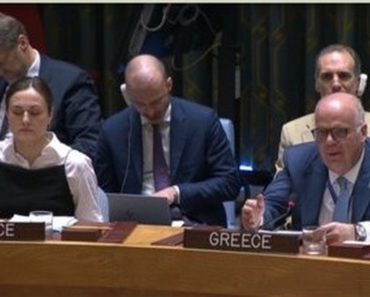
German Chancellor Friedrich Merz (right) and Greek Prime Minister Kyriakos Mitsotakis arrive for a news conference after a meeting at the Chancellery in Berlin, on May 13, 2025. [AP]
As a German proverb goes: “It’s never eaten as hot as it’s cooked.” The wisdom applies to politics as well – bold campaign promises are often softened, diluted, or ultimately adapted to reality. A current case in point: the migration policy of Germany’s new chancellor. Under pressure from the far-right, Friedrich Merz entered office with the pledge to drastically curb irregular migration and enforce the deportation of those required to leave the country. But as the unfolding details show, delivering on that promise is easier said than done.
Few issues have shaped European politics in recent years as profoundly as the question of how to manage migration. The rise of right-wing parties is testing the resilience of liberal democracies internally, while the refugee question continues to strain bilateral relations externally. German-Greek relations are no exception. Marked by highs and lows in the past, they now face serious new challenges: diverging positions on migration.
At the heart of the tension lies so-called secondary migration – individuals who fled their home countries, were first granted protection status in Greece, and then moved on to Germany to file a second asylum application. The exact size of this group is hard to pin down officially. Media reports estimate it at around 100,000 people, with some sources suggesting even higher figures.
“The level of secondary migration to Germany must go down. Returns must go up.” With these terse words, Chancellor Merz spelled out his expectations to Greek Prime Minister Kyriakos Mitsotakis in mid-May. It was his first meeting with a foreign head of government, and the symbolism did not go unnoticed. Both sides openly admitted to the press that no real progress had been made. Responsibility for further discussions was delegated to the interior ministers of both countries.
“As long as there is no fair burden-sharing within the European Union, Greece will not accept any returns,” Greek Interior Minister Makis Voridis had already stated – effectively dashing hopes for a swift agreement. According to diplomatic sources, Germany’s new interior minister, Alexander Dobrindt, is expected to travel to Athens soon for his inaugural visit, with the ambitious aim of solving issues that had eluded many of his predecessors.
Preparatory work is already under way among senior officials from both countries, who are set to meet in Athens in early June for their semiannual consultations. It will be the 14th such meeting – a reminder that migration has long been a recurring theme in German-Greek relations, and a signal that both sides remain committed to keeping the conversation going.
The experts will have plenty to discuss. Germany’s new government has made a political shift in migration policy one of its core priorities. Additional momentum has come from a recent ruling by Germany’s Federal Administrative Court: In mid-April, judges in Leipzig determined that deportations of single, healthy and employable migrants to Greece are generally lawful. The ruling has been interpreted as a tailwind for Berlin’s new political course.
Soon afterward, the Interior Ministry reportedly ordered a stepped-up pace of deportations. It remains unclear how many individuals will be affected. Well-informed sources estimate that as many as 40,000 people in Germany could soon receive formal instructions to return to Greece.
In migration diplomacy, numbers matter – and behind the numbers are people. People one country is trying to remove, and another, for various reasons, is reluctant to receive. In the past year, Berlin officially requested the return of approximately 13,000 secondary migrants. According to Greek media reports, Athens was prepared to review 1,000 cases. In the end, only 14 individuals actually returned. The new German government has made it clear that this imbalance must end.
Still, Berlin is aware of a hard truth: It cannot resolve this issue without cooperation from Athens. “This won’t work unless we talk to one another,” German diplomats in the Greek capital insist. The effort to foreground shared interests is audible. “The external borders of the European Union are also our borders,” Germany’s ambassador to Athens, Andreas Kindl, recently stated in an interview, highlighting German support for Greece’s border protection measures.
Berlin and Athens appear determined to jointly push for a European solution and for a fairer distribution of refugees across the bloc. Yet past experiences with intra-European solidarity offer little reason for optimism.
Meanwhile, Crete and the nearby island of Gavdos have become a new gateway for refugees into Europe. Greece now finds itself confronting a dual challenge: in the south, the barely controllable Mediterranean route, which many view as a last hope despite its life-threatening risks; and now – from the north – Germany’s push for large-scale returns.
Just how many deportations will ultimately be carried out remains an open question. Behind closed doors, officials speak of a target of 10,000 – a figure considered realistic, not least because Greece is experiencing a labor shortage and is in need of young, able-bodied workers.
But more significant than the number of potential returnees are the medium- and long-term consequences of Germany’s political shift for Greece. The informal arrangement by which Greek authorities allowed the vast majority of refugees to move on to Germany has already begun to unravel. Berlin’s stricter border controls are creating a domino effect – one that is likely to result in many more migrants remaining in Greece than in the past.
Dr Ronald Meinardus is a senior research fellow at the Hellenic Foundation for European and Foreign Policy (ELIAMEP).







